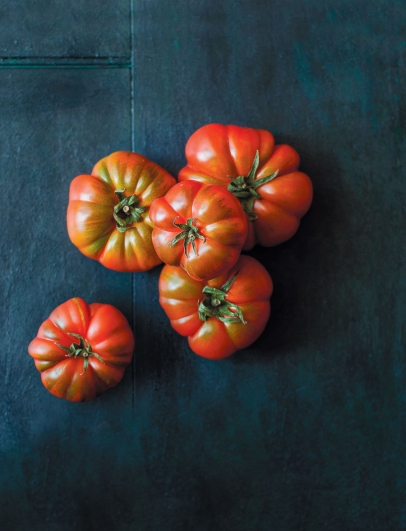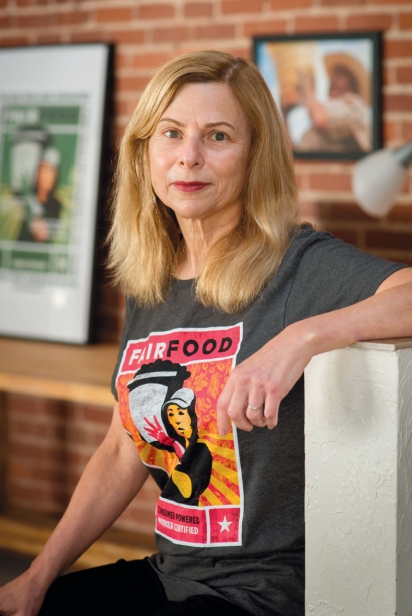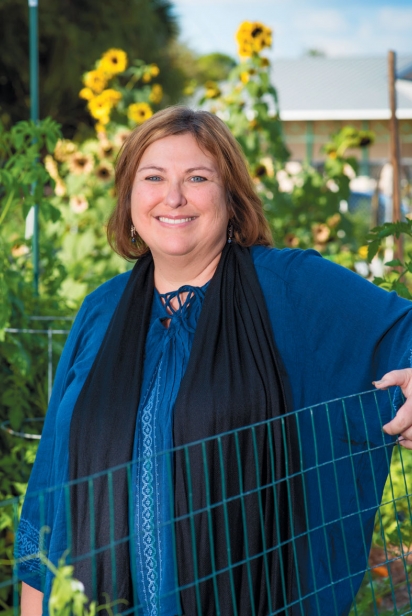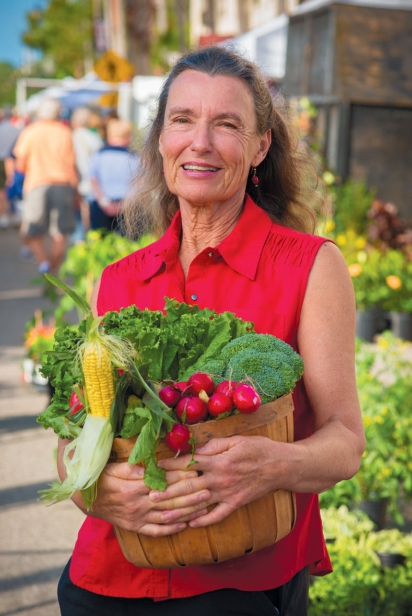On The Front Lines
Three women take active roles in building a better food system
You’ve heard “you are what you eat.” But when was the last time you stopped to really ponder that adage and consider the ways food shapes us on individual and community levels? The impact of eating has a ripple effect, going to work on all systems of the body, connecting groups of people who might never cross paths, and shaping the course of the future. If we aim to better ourselves, our communities, and the world at large, then it’s worth looking beyond the “what” of food and its mass consumption to get at the “how.” Should you need some inspiration, these three local women lead by example.
FAIR FOOD FIGHTER
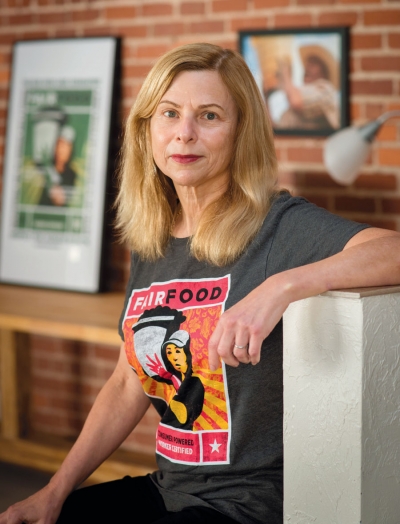
Laura Safer Espinoza
Laura Safer Espinoza brought along a steamer trunk of accomplishments when she retired to Florida in 2010. Human rights had been her lodestar from the beginning of her law career all the way through 20 years on the bench of the New York State Supreme Court. On its surface, Fort Myers seemed an ideal place to savor the fruits of hard work well done.
“To be honest, Southwest Florida is a beautiful place and there’s a lot to enjoy here,” Safer Espinoza says. “Coming from my background, it was really difficult once I heard that the particular place we had picked to live was also known by federal prosecutors as ‘ground zero’ for modern-day slavery, in large part due to the cases of forced labor in agriculture.”
Safer Espinoza learned of horrific conditions in which workers on Florida tomato farms were subjected to wage theft, pesticide toxicity, physical abuse, and sexual assault. Fear of retribution kept untold victims silent.
“And that was happening less than an hour from our house,” Safer says. “That was not something that was very conducive to quiet retirement.”
Researching these injustices led Safer Espinoza to the Coalition of Immokalee Workers (CIW), the human rights organization largely responsible for rooting out forced labor and abuse in Florida tomato fields. She immediately reached out to volunteer her time, skills, and passion for justice in any way the CIW could use them.
In the 12 years prior, the CIW’s fierce campaigns raised wages, liberated 1,200 workers from involuntary servitude, and recruited giants from fast food, supermarket, and food service industries to join their cause. They were poised to launch the Fair Food Program, a revolutionary partnership among workers, growers, and buyers that would be the platform for ongoing efforts. In Safer Espinoza, the CIW instantly recognized the person whose drive and experience would ensure the success of this unprecedented program. No envelope-stuffing or phone-banking for this woman. Instead, they asked Safer Espinoza to take the helm of the Fair Food Standards Council (FFSC) as its executive director.
The only watchdog organization of its kind in U.S. agriculture, the FFSC implements, oversees, and enforces all parts of the Fair Food Program. Safer Espinoza’s staff answer calls to a 24-hour worker complaint hotline, undertake complaint investigations, and audit participating farms to ensure all Fair Food Program standards are upheld.
Since Safer Espinoza took leadership of the FFSC in 2011, she’s seen the Fair Food Program expand beyond tomatoes and Florida state lines. She’s seen Walmart join the list of participating buyers with its 20% share of national grocery tomato sales. But supermarkets still impose the most drag on the program’s forward march. Now Safer Espinoza wants consumers to invest in social responsibility.
“It’s such a fundamental thing to say to your family, to your children, that the men and women who harvest the food we eat deserve to be treated in a just and humane way,” Safer Espinoza says.
It starts with demanding that local groceries stock tomatoes, strawberries, and green peppers certified by the Fair Food label. And there’s a new way to put your dollar to work for fair food: Donations to the Fair Food Sustainer Program bring consumers alongside farmworkers and monitors as agents of nationwide reform in agriculture. Warriors like Safer Espinoza don’t seem to need much rest, but they keep up the good fight only with a supportive community at their backs.
GROWING FUTURE GROWERS
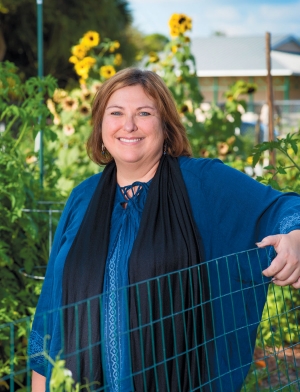
Stacy Spriggs
Buried in a legacy of powerful words, Mahatma Gandhi left one quote that’s become dear to gardeners: “To forget how to dig the earth and to tend the soil is to forget ourselves.”
Even without a Gandhi endorsement, it’s widely recognized that a garden makes for an incredible classroom—so why doesn’t every school have one? Lack of resources poses one major obstacle, but more troubling is a lack of gardening know-how among primary and secondary educators. Are future generations then doomed to the amnesia that Gandhi’s words sought to prevent?
Not on the watch of Stacy Spriggs and the Sarasota County Extension, the local outreach office of the University of Florida’s Institute of Food and Agricultural Sciences (UF/IFAS). When Spriggs came to the Extension as its new coordinator of agriculture and natural resource programs, she got to work on a support system for school gardens. At that time, Spriggs estimates 23 gardens existed in Sarasota County schools. Five years and a whole lot of shoveling, mulching, and weeding later, that number has more than doubled, totaling 60 school gardens.
Spriggs speaks with the humility of one who works close to the earth: “All these gardens are the result of interested teachers, and we have lots of volunteers and parents involved along the way. I certainly can’t take all the credit for it.”
Every semester, the Extension lays groundwork to sprout an average of four new school gardens. Spriggs is the one who helps each take root with UF/IFAS resources such as expert garden designs, curriculum for all grade levels, and grant assistance. Developed by top agricultural researchers, the infrastructure UF/IFAS provides to nurture school garden projects is enhanced by UF-trained Master Gardeners who volunteer to share their knowledge with budding gardeners in their living classrooms.
“We’re interested in teaching children where their food comes from—so they understand that it doesn’t come from boxes, it comes from plants—increasing agricultural awareness, and teaching basic gardening skills,” Spriggs says. “It’s very empowering for youth to be able to produce their own food.”
Spriggs’ work in school gardens also empowers kids to think big about their futures. When one boy is fascinated by ladybugs, Spriggs tells him about people who grow up to be entomologists and get paid to study insects. The ones who love getting their hands dirty find out there’s such thing as soil scientists.
“I’ve had students comment about wanting to grow lettuce for the [International] Space Station. So—that’s new,” Spriggs says, noting how this points to an innovative generation: “That’s not traditional agriculture!”
When I talked to Spriggs, students were busy picking a fall crop of green beans, carrots, broccoli, cabbage, and dill. This semester they’ll plant tomatoes, peppers, onions, cilantro—a complete salsa garden ready to harvest in time for Cinco de Mayo. What a delicious lesson! Surely these kids will never forget the source of sustenance, now they have proof that the power to grow it rests right in their hands.
GARDEN OF MEDICINE
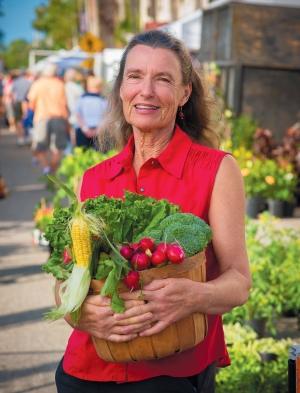
Cristina Babiak
Dr. Cristina Babiak, MD, sees patients in a warm-lit office that was once her son’s bedroom. The bay windows look out onto a winter landscape that’s astonishing, even for Florida: Here are orchids hanging like jewels among ripening fruit in the trees, and raised boxes bristling with green herbs. Babiak has been a doctor for longer than I’ve been alive, but it’s in this Englewood home that Babiak has spent the last 10 years cultivating a natural medical practice in which she feels more empowered than ever to administer healing. And it all begins in the gut.
Babiak was introduced to the concept of healing foods as a kid growing up among gardens in Kentucky. She came to Florida to study medicine at Florida Hospital Orlando, which promoted a vegetarian diet and gave cooking classes to patients. Babiak now smiles wryly to remember the warnings she heard while deciding how to shape her own medical practice.
“I was told that you can’t make any money in preventative medicine,” Babiak recalls. “But I did.” And although her path was successful, it was no walk in the park.
“I was doing everything for everybody in the office, the hospital, and nursing homes, and I’d had two babies during training.” With all the demands upon her, Babiak was frustrated by an inability to spend the time with her patients that she deemed adequate.
“It takes a lot of time to change what people eat,” Babiak says. “It takes a tremendous amount of support. It’s like changing a religion.”
Ultimately stress overwhelmed Babiak, trapped in the impossible position of a physician unable to heal herself. “I thoroughly wrecked my health,” she says, “so I had to stop.”
For a while Babiak found respite and restoration among North Carolina’s forests and falls. Upon returning home, it dawned on her that the empty nest left by her grown children could become the perfect place to focus on health care, for herself and others, in the way she always wanted.
“My garden really needed me here, too. It does better when it’s adored and cared for. It’s important to be able to eat out of my yard—I teach that,” Babiak says. “Eating out of your yard is an excellent way to improve your microbiome.”
That “microbiome” is the complex living system of microorganisms— 100 trillion strong—that inhabit the human gut and, as Babiak says, “run our whole show.”
“The biggest thing is gut health,” Babiak asserts. “That’s what drove me to natural medicine, because all we have in allopathic medicine are drugs that’ll shut the gut down.” That would explain why nausea and abdominal pain are among the first side effects listed for many prescription drugs, from blood pressure pills to antidepressants. Babiak’s “gut-first” approach to healing has relieved patients’ anxiety, insomnia, joint inflammation, and other issues seemingly unrelated to food.
“In my 25 years in the office where I prescribed medicines, I never had anybody come up to me and say, ‘I am so glad you prescribed this beta blocker for me,’” Babiak laughs. But today, she says an encounter with a patient is “like a little love fest.”
“My patients really feel good.”


